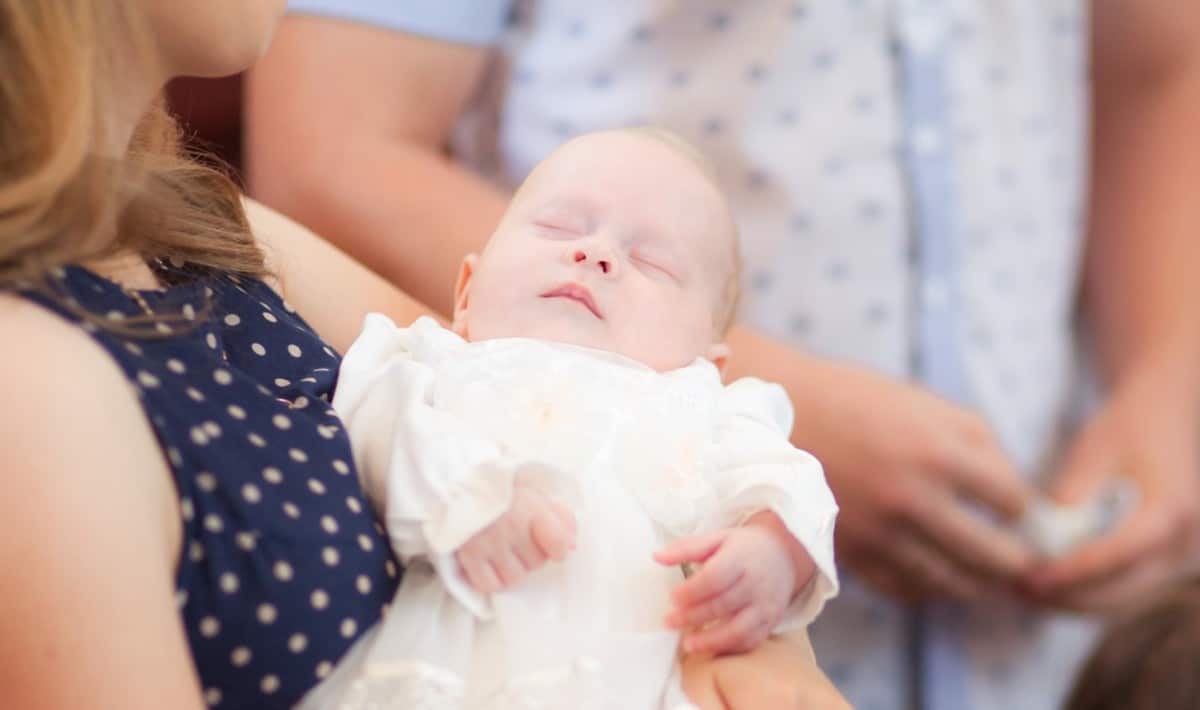
If you’ve never been a godparent before it’s natural to wonder what will happen at the baptism. What will you need to say and do as a godparent at the baptism ceremony? If the child is being baptised into a different denomination to your own they may do things a little differently. It’s good to think about these things and find out before the big day.
At a babies baptism the godparents and parents stand at the front of the church and are asked if they intend to help raise the child with faith in Jesus. They also answer questions about christian belief on behalf of the baby, before the baby is baptised. The parents and godparents reply together.
My 3 children were baptised in a Lutheran church so I’ll give you a bit of a run-down of what happened for us. I’ve also done a bit of research on a couple other denominations to see what the differences are.
What Does a Godparent Say at a Baptism?
There are two main parts where the godparents together with the parents of the baby being baptised need to respond during the service:
1. Intention to Help Raise the Child in Faith
First the pastor addresses the parents and godparents/sponsors (same thing) and says (for this example we’ll assume the baby is a girl):
“Parents and Sponsors, Since you have brought _______ to be baptised, you are responsible for her upbringing in the church.
- Remember her in your prayers.
- Bring her to the services in God’s house and
- Teach her the Lord’s prayer, the Creed and the Ten Commandments
- Remind her of her baptism,
- Set her a good example, and
- Provide for her instruction in the faith.
Do you intend to do this? (If so, say ‘Yes, I do’.)”
Then the godparents and parents together say aloud “Yes, I do.”
This first part is titled Admonition. The meaning for Admonition from the Oxford dictionary is a firm warning or reprimand. It comes from the Latin word admonitio which means (cautionary) reminder.
So this part is reminding us of the seriousness of our role that we are agreeing to.
The pastor then gently with his thumb marks the cross on the child’s forehead as a sign that Jesus has redeemed them (which means Jesus’ death has paid the price of a ransom, releasing them from bondage to sin and death).
There is also a prayer for the child, the Lords prayer and blessing before the next part where godparents and parents need to respond.
The Lords prayer is said all together, but the words should be up on a screen or on a paper handout if you don’t know it off by heart.
2. Answering Faith Questions on Behalf of the Child
This part is split into two:
1. Renunciation
Renunciation is a formal rejection of something. And in this case you will be rejecting Satan on the child’s behalf.
The pastor says “Members of the congregation: Answer on behalf of ________ as she/he renounces he devil and declares allegiance to the Triune God.”
“Do you renounce the devil and all his works and all his ways? (Say ‘Yes, I do’.)
So everybody who is at church answers this with the godparents and parents on behalf of the child.
2. Confession
Next is the Confession which in this case means a statement setting out essential religious doctrine which is the basic beliefs of the Christian Church.
The pastor says “Do you believe in the Triune God: Father, Son, and Holy Spirit?”
In response the godparents, parents and whole congregation answer on behalf of the child with the words of the Apostles Creed:
“I believe in God, the Father almighty, maker of heaven and earth. And in Jesus Christ, his only Son, our Lord, who was conceived by the Holy Spirit, born of the Virgin Mary, suffered under Pontius Pilate, was crucified, dead, and buried. He descended into hell. The third day he rose again from the dead. He ascended into heaven, and sits at the right hand of God, the Father almighty, from thence he will come to judge this living and the dead.
I believe in the Holy Spirit, the Holy Christian Church, the communion of saints, the forgiveness of sins, the resurrection of the body, and they life everlasting. Amen.”
If you don’t know the Apostles Creed off by heart don’t worry – it will usually be either up on a big screen or you will be given a sheet of paper with the words on it.
After this the child is baptised.
Anglican
The Anglican service seems to be quite similar with some different wording, but very similar meaning.
The godparents respond saying “With the help of God we will”
You can find some more information about baby baptisms from the Church of England website
Catholic
The Catholic church again is similar but asks some extra questions like:
“What name have you given your child?”
“What so you ask of God’s church for ________?” (answer: baptism)
The Catholic Church of Australia goes into more detail on their website. This website also gives a really good explanation and steps in a Catholic baptism.
So there are some pretty serious things that godparents need to commit to at the baptism service. Have a really good think if you believe these things first.
What Does a Godparent Do at a Baptism?
You may be wondering what you need to do at the baptism. Let’s run through these below:
- The godparents will usually sit at the front of the church with the parents and child.
- When it’s time for the baptism the pastor will call you forward. The godparents together with the parents and baby will walk to the front of the church (when our children were baptised this happened really soon after the start of the service)
- You will need to respond to the pastor when he asks questions of the godparents and parents – see detailed questions and responses above.
- When the baptism takes place you will need to be near the baptisimal font (where the water for baptism is held). The pastor will invite you all to where you need to stand. Normally the parent or pastor holds the baby when the water is sprinkled. If you as godparent are expected to hold the baby the parent should tell you this before the service.
- After the baptism the pastor will indicate what needs to happen.
- When our children were baptised we were asked with the godparents to all put our hands on the baby while the pastor said a prayer for the baby.
- Then a candle will be lit from the big candle in the church called the paschal candle (which symbolises the light of Jesus coming into the world). The small lit candle will be handed to either the parents or godparents (we blew it out when we were back in our seats). It is suggested that this candle is lit each year on the child’s baptism birthday. There may also be some papers or a small gift given from the pastor which you may need to hold.
That’s it. The pastor will indicate when it is time to return to your seat.
Again it may be slightly different at different churches, but should be basically the same.
What is Expected of a Godparent at the Baptism?
There are a few things that the parents will probably expect of you at the baptism that maybe haven’t been formally spelt out:
- Get to the church early – at least 15 minutes early. If the service starts at 9 then get there at least by 8.45. Check with the parents when they’re planning to get there. Wait for the parents in the foyer if they’re not there already so you can walk in and find your seats together – follow their lead. It’s good to not be rushed when you get there so there is time a quick chat with the parents and the pastor before the service begins (and admiring the baby/child). Then you can settle in and think about the importance of the day.
- Formal church dress – dress with respect. Some people will dressup more than others and that is fine. Maybe check what the parents are planning to wear. I feel most comfortable when I’m wearing something similar to the other people standing with me. I would recommend collared shirt (tie is optional – check with parents) and pants for guys. For girls I would recommend a below the knee skirt/dress (pants are fine too) and nice top that covers your shoulders and isn’t too revealing.
- Attend the reception after – most baptisms will have a lunch reception or something similar afterwards. As godparent it is expected that you are there, unless there is a truly important reason why you can’t be, which you will need to discuss with the parents.
- Be attentive to the child – this is a big day for the child. You may like to offer to hold the baby if the parent’s arms are getting sore or if they are trying to organise something. Rock the baby. Smile at the child. Play with him/her. However, also be mindful that others will want to hold the baby also. This can be a tricky one to balance!
What is the Godparents Role After the Baptism?
The main responsibility in raising the child in faith falls on the parents. The role of the godparent is to help. Some ideas are:
- to pray for your godchild – talk to God about whatever problems you can see they might be having, or that God would protect them and keep them close to him.
- help them remember their baptism by giving a small gift on their baptism birthday/anniversary
- set a good example by living a life of love – the way Jesus showed us
Please remember that no one is perfect. I certainly don’t live up to all the promises I made as a godparent all the time, but when I do remember I try to do the best I can. We need God’s help in fulfilling the promises made at a baptism. All of us do. If you trust God to help you with these things – you will be fine.
Preparing this post has been great for me as it’s made me revisit the promises I made to God when I agreed to be a godparent. These are serious promises that I made before God. I want to honour these promises as best as I can.
If you’re feeling like the role of godparent is a bit more than you’d bargained for then please have a really good think. Maybe dig into the bible and see if you agree with what it has to say – start with John (I find his story of Jesus the most interesting). The Message bible is a fantastic as it reads like a novel in every day language.
If you don’t think you can honestly stand in front of God and make the statements described above then maybe it’s a good idea to talk to the child’s parents and see if there is another way you can be a special part of their child’s life without compromising your integrity.




